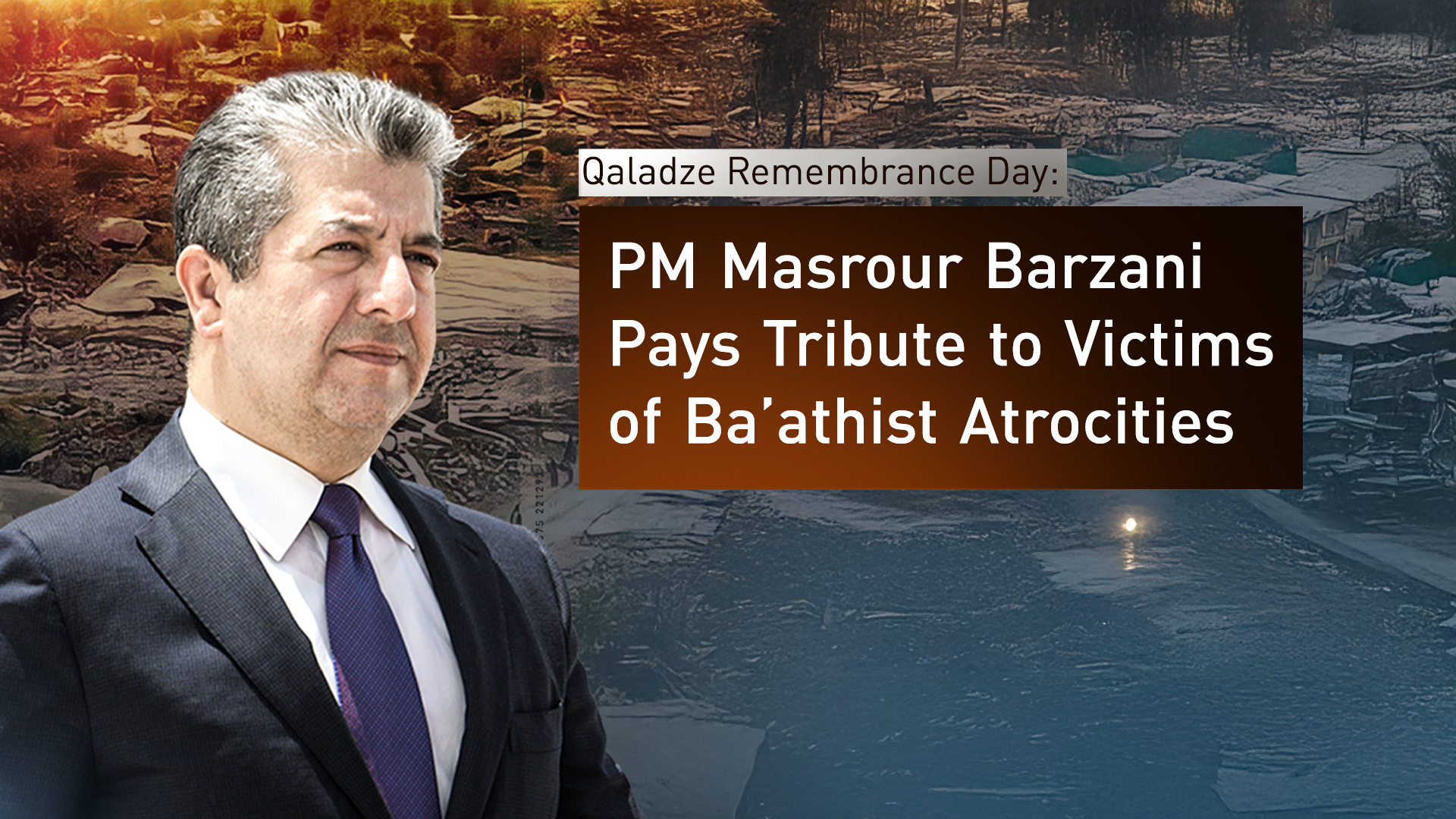Qaladze Remembrance Day: PM Masrour Barzani Pays Tribute to Victims of Ba’athist Atrocities
"We will always remember them and salute their sacrifices,” said PM Barzani.

ERBIL (Kurdistan24) — Kurdistan Region Prime Minister Masrour Barzani on Wednesday paid tribute to the victims of the 1974 Qaladze bombardment and the protesters killed in 1982 for commemorating the attack, marking the 51st anniversary of one of the Ba’ath regime’s earliest atrocities against the Kurdish people.
“Today we honor the memory of the martyrs of the Qaladze bombardment by the Ba’ath regime 51 years ago,” Barzani wrote in a post on X. “We also remember the martyrs who were shot at a peaceful protest to commemorate the attack in 1982. We will always remember them and salute their sacrifices.”
Today we honor the memory of the martyrs of the Qaladze bombardment by the Ba’ath regime 51 years ago.
— Masrour Barzani (@masrourbarzani) April 24, 2025
We also remember the martyrs who were shot at a peaceful protest to commemorate the attack in 1982.
We will always remember them and salute their sacrifices.
A Day Etched in Kurdish Memory
On April 24, 1974, the Iraqi Ba’athist regime, launched a brutal airstrike on the town of Qaladze in Sulaymaniyah province. The assault, carried out by fighter jets, deliberately targeted civilian infrastructure, including a branch of the University of Sulaimani and residential neighborhoods. The bombing killed dozens, including students, professors, and local residents—many of whom were women and children. The exact number of casualties remains disputed due to the regime’s suppression of information at the time, but eyewitnesses and historians describe the event as a massacre.
Qaladze had become a symbol of Kurdish resistance and intellectual revival, hosting many displaced students and teachers after the Kurdish liberation movement intensified in the early 1970s. The bombing aimed to crush that spirit and send a warning to all who resisted Baghdad’s Arabization and assimilation policies.
The 1982 Protest Massacre
Eight years later, in 1982, a peaceful protest held to commemorate the victims of the Qaladze bombing ended in further bloodshed when Iraqi security forces opened fire on demonstrators. That attack added another layer of pain to an already searing memory and became emblematic of the Ba’ath regime’s intolerance toward Kurdish identity and collective remembrance.
The crackdown on the 1982 protest is rarely mentioned in official histories but remains vivid in Kurdish collective memory. Families of the victims still recall how government forces stormed the gathering without warning, killing and wounding unarmed civilians.
A Legacy of Resilience
The Qaladze bombing marked one of the earliest uses of aerial bombardment against the Kurdish civilian population, foreshadowing future atrocities such as the 1988 Halabja chemical attack and the Anfal campaign that led to the deaths and disappearances of over 180,000 Kurds.
Prime Minister Barzani’s annual remembrance reflects the Kurdistan Regional Government’s (KRG) continued efforts to honor victims of past regimes and to ensure that Kurdish history, particularly the pain endured under Ba’athist rule, remains part of the national consciousness.
Calls for International Recognition
Human rights organizations and Kurdish activists have long called for the Qaladze bombing and the subsequent suppression of protests to be formally recognized as war crimes. While some international observers acknowledge the broader campaign of repression against Kurds in Iraq as part of Saddam Hussein’s genocidal policies, individual events like Qaladze often receive less attention.
“Each of these tragedies forms a mosaic of systematic oppression,” said Dr. Hoshyar Mahmoud, a historian specializing in modern Kurdish history. “Qaladze was not just a bombing; it was a message. And remembering it today is an act of defiance and identity.”
Looking Ahead
As Kurdistan continues to navigate a turbulent regional landscape, the legacy of Qaladze remains a guiding light for many Kurds—both as a symbol of suffering and as a reminder of the resilience and perseverance of their people.
The annual commemoration serves not only as a tribute to those lost but also as a reaffirmation of the Kurdish people’s commitment to freedom, justice, and self-determination.
